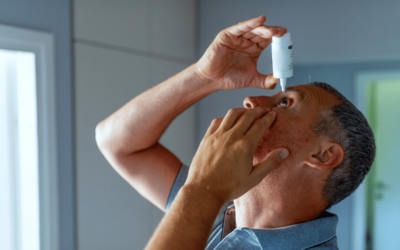Have you ever wondered why some people are near or farsighted, while others don’t need glasses at all? Are eye diseases like glaucoma, cataracts, and macular degeneration hereditary? Let’s take a look at how our genes influence our eye health and how you can protect your eyes.
Genetics and eye health: how are they related?
Many eye diseases can be inherited, so if someone in your family has an eye condition, you may also be at risk. A few of the eye conditions which have a genetic component include:
Myopia
Myopia (nearsightedness) has a genetic component. Studies have shown that children with one myopic parent have a three times higher risk of developing myopia, while children with both myopic parents have a seven times higher risk.
Retinitis pigmentosa
Retinitis pigmentosa is a group of inherited diseases that affect the retina, the part of the eye that detects light and sends signals to the brain. It can cause vision loss and blindness.
Age-related macular degeneration (AMD)
AMD is a condition that affects the macula, the part of the retina responsible for central vision. It is the leading cause of vision loss in people over 60 years old, and genetics can play a role in its development.
Glaucoma
Glaucoma is a group of eye conditions that damage the optic nerve, which carries information from the eye to the brain. It can lead to permanent vision loss if left untreated, and certain types of glaucoma have a genetic component.
Genetics can play a role in your eye health, but there are many other factors at play. Lifestyle choices such as smoking or exposure to UV light can also play a role. Additionally, early detection and treatment can make a significant difference in the progression of many eye conditions. Regular comprehensive eye exams are key to catching early signs of eye diseases and other health conditions. During an eye exam, your optometrist will check for signs of eye disease and share advice on how to keep your eyes healthy. This might include recommendations for specific nutrients or supplements, lifestyle changes, or specialized treatments to manage or prevent eye conditions.
Genetic testing for eye conditions
If you’re worried about your risk of developing certain eye conditions, genetic testing can offer valuable insights into your individual risk factors. This type of testing looks for mutations in certain genes that are associated with different types of vision problems. For example, some gene mutations increase a person’s risk of developing glaucoma; others may make them more susceptible to retinal detachment or cataracts. By analyzing your DNA sample, your doctor can identify which gene mutations are present and recommend treatments or lifestyle changes based on your specific needs.
By scheduling regular eye exams and practicing healthy habits, you can reduce your risk of developing eye conditions and maintain good vision for years to come. If you have a family history of eye disease, schedule an eye exam with our eye doctors in Denham Springs to learn about the steps you can take to protect your vision!



